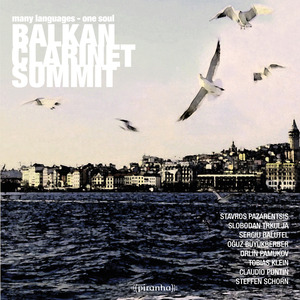 If you at all like instrumental music from southeastern Europe, if you enjoy the sound and versatility of the clarinet, or if you just like wildly eclectic international music – personally, all three describe me – then this Balkan Clarinet Summit disc is a must-have.
If you at all like instrumental music from southeastern Europe, if you enjoy the sound and versatility of the clarinet, or if you just like wildly eclectic international music – personally, all three describe me – then this Balkan Clarinet Summit disc is a must-have.
On its face it’s such a good idea you wonder that nobody has done it before: bring together clarinet players from all over the region and other parts of Europe in an ensemble to mix and match their local music. (The clarinet, after all, is the second most common and popular instrument in Balkan ensembles, behind the violin.) So a couple of international clarinet masters, Swiss jazz player Claudio Puntin and German player and Turkish music expert Steffen Schorn, were enlisted by the Goethe Institute in Athens to helm the project. They spent several months signing up players from Turkey, Greece, Bulgaria and Romania who were among the best in their countries but who could also adapt to other traditions; working up a repertoire and rehearsing it. Then they recorded it in concert halls and cathedrals around the region, and also made a documentary film. Here’s the official trailer:
It’s almost too much clarinet music, with 14 tracks lasting 72 minutes, but there’s a lot of variety here, sonically as well as stylistically. All of the music is played on various members of the clarinet family, from the huge double-Bb contrabass up to some of the piccolo clarinets, not just the sopranos we’re all more familiar with. Some of my favorite moments are those that feature the deep bass and contrabass soloing in front of an ensemble of altos and sopranos, sounding like a small chamber orchestra. I’m thinking particularly of Schorn’s playing on his own piece “Poeme,” although the droning bass on Serb Slobodan Trkulja’s long and beautiful “Za Moc Oza” that sounds like an organ’s bass pedals is also moving and impressive. And Puntin plays a sublime bass line under the increasingly elaborate Greek Klarino virtuosity of Stavros Pazarentsis on the opening track “Nostalgia.”
There are some traditional fast Balkan dance pieces here like the short and sweet “Geamparale” featuring Balutel’s delightfully clear and light staccato playing; and the swirling “Severniaski Tanc” in the peppy 9/8 Bulgarian style, with Orlin Pamukov’s amazingly virtuosic playing. Schorn’s instrument sounds more like a duduk on the lyrical “Colors of Istanbul,” and Balutel plays a virtuosic lead on the traditional Romanian “Breaza.”
Things get less traditional on the disc’s second half, including Puntin’s giddily creative and witty “Snake Lick Jab” on a specially modified and distorted instrument; some vocal beat-boxing behind Pazarentzis on his homage to his home town “Naoussa”; and the closer, Trkulja’s impressive “Pitagorino Oro” which at times sounds like a post-modern classical ensemble crossed with PDQ Bach.
Just like the part of the world that birthed this music, this set is filled with immense variety in textures, colors, sounds and moods. Above all, it’s joyful music, played with great class, wit and verve. All lovers of Eastern European music will enjoy this. Want a sample? You can listen to full tracks on the Piranha website.
(Piranha, 2015)
